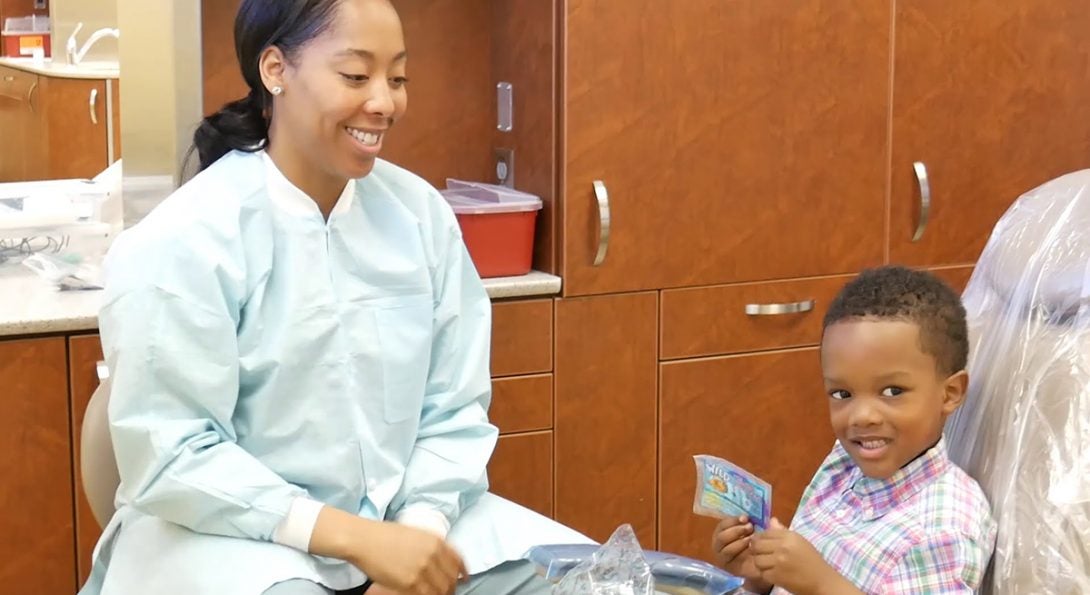Students to Learn to Treat Infants, Toddlers Under $1M HRSA Grant

The U.S. Department of Health and Human Services’ Health Resources and Services Administration (HRSA) has awarded the College of Dentistry a $1 million grant for five years to help provide dental students with education and training in the care of children up to five years old.
“This is a population that is underserved in dental care—partly because their oral health status is just emergent, and party because parents and the community have not been acclimated to the expectation of such a young person needing dental attention, explained Dr. Caswell Evans, Associate Dean for Prevention and Public Health Sciences.
Few dentists—and few dental schools, “have this age cohort in their curriculum, so the students graduate not being comfortable with that age group,” Dr. Evans noted.
“This funding is intended to give students experience in treating this age group, and it also is in this group that we can begin to dissect the risk factors that lead to early childhood caries.”
The initiative will have several components and several partners. D-2 students will rotate to the Mile Square Health Center to work with pregnant women in the center’s prenatal program, “talking to pregnant women about the oral health of the as-yet unborn child and what they can do even in the child’s infancy to improve his or her oral health,” Dr. Evans explained.
Since many of the Mile Square moms-to-be deliver their babies at UI Health, these discussions will also set the stage for them to bring their youngsters to the College for oral healthcare.
“Although Mile Square is a part of the UI Health system, it is a new partner for the College,” Dr. Evans said.
When HRSA solicits grant applications, it outlines areas it would like grantees to address.
“One of those possibilities was having a rural component,” Dr. Evans explained, noting that Douglas County, IL, is home to a Federally Qualified Health Center (FQHC) that provides care to many of the Amish population there.
“We will be sending D-3 students, with faculty supervision, to Douglas County to provide screenings and clinical care to youngsters up to age five,” he noted.
In suburban DuPage County, D-3s will provide care to youngsters who are developmentally disabled, under the supervision of Dr. Robert Rada, Clinical Professor of Oral Medicine and Diagnostic Sciences.
D-3s also will work in Chicago at the Englewood Neighborhood Health Center Woman, Infants, and Children (WIC) Clinic on 63rd Street, providing them with hands-on experience dealing with young children.
The College has 22 community clinic partner sites in Illinois in which D-4s perform extramural rotations, and eight of those sites will partner with the College under this grant. While students are on rotations there, those sites will dedicate specific times when they will provide oral healthcare only to children age five or younger.
Also under this grant, in collaboration with Associate Dean for Student and Diversity Affairs Dr. Darryl Pendleton and his office, the College will work with undergraduate pre-dental clubs, with which the office already has a relationship, to educate them about the oral healthcare needs of youngsters age five and under.
The grant also has a digital innovation component, led by Chris Bevel, Director of Digital Marketing and Research Programs.
“We’ll be launching a never-before done digital platform—leveraging social media—to enhance the student and patient experiences, and further drive oral health outcomes,” Bevel said. “It will be sort of like Fitbit for oral care.”
The goal is to use existing technology in new ways to establish a digital community within existing physical communities to improve oral health knowledge and hygiene skills and to track compliance and progress toward clinical goals.
“Patients will be able to easily ‘opt-in’ and invite others to participate in a social media style peer-to-peer support group meant to reinforce healthy habits,” Bevel said. “And, it will have fun, game-like features to really get both parents and their children engaged to adopt healthy dental habits, improve dental health, and ultimately prevent chronic disease.”
The web-based tools, content, and functions will be easily accessible via desktop computers, tablets, or smartphones and integrated with existing social media networks such as Facebook. “The whole system will be user-friendly and easy to use via mobile devices, lowering barriers for opt-in,” Bevel said.
Students will be able to interact with patients and share data via social media. Caregivers—College of Dentistry students and oral health providers at community health centers—will have enhanced capability to educate patients and track their clinical goal progress. Caregivers can also post messages and share stories with parents and the support group.
“The intention for all of this is that when the dental students graduate, they will be much more comfortable seeing children age five and younger in whatever practices they go into,” Dr. Evans said.
The team that worked on the grant application included Dr. Evans; Khatija Noorullah, Clinical Community Academic Manager; Dr. Ian Marion, Clinical Assistant Professor and Director of Pre-doctoral Pediatric Dentistry; Bevel; Dr. Pendleton; and Dr. Rada.
The grant has an evaluation component, so the College’s progress will be tracked by a project officer at HRSA and by an evaluation expert from the University of Illinois College of Medicine Chicago, who will work with the College of Dentistry on evaluation metrics for the grant.